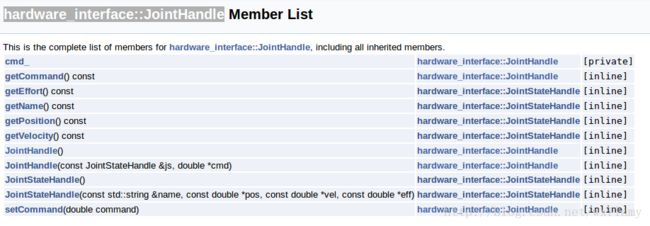为串联机械臂写一个ROS控制器
上一篇博客中,实现了gazebo中控制器的应用,但是由于PID调的不好,控制效果实在是不好意思贴出图来,作为一个控制理论与控制工程毕业的人,我怎么忍得了。今天就试着来编一编控制器。当然是参考了一些教程。12
ROS中有一些标准的控制器,比如joint state, position, trajectory,这些在gazebo仿真中也用到了一部分。
加载控制器后,第一个执行的函数就是初始化int(),这并不是启动控制器,初始化函数的参数包括机器人的状态参数和Nodehandle。初始化函数只执行一次。
启动控制器函数starting(),也只执行一次,用于控制器的启动。
update()函数保证了控制器的活跃状态。以1000Hz的频率执行代码,意味着一微秒就要计算完成一个执行周期。
最后stop()停止控制器命令也只执行一次。
建立一个控制器的过程需要以下几个步骤:
- 新建一个带有必要依赖的ROS包;
- 编写控制器C++代码;
- 将C++类注册或者发布为一个插件;
- 在XML文件中定义插件;
- 更新package.xml来发布插件;
- 编写CMakeLists.txt
- 编译代码
- 为控制器参数编写配置文件
- 在gazebo中进行仿真
- 使用controller manager加载控制器。
创建控制器功能包
$ catkin_create_pkg my_controller_pkg roscpp pluginlib controller_interface hardware_interface建立一个控制器的头文件
#include
{
private:
hardware_interface::JointHandle joint_;
double init_pos_;
ros::Subscriber sub_command_;
public:
/**
* \brief Store position and velocity command in struct to allow easier realtime buffer usage
*/
struct Commands
{
double position_; // Last commanded position
double velocity_; // Last commanded velocity
bool has_velocity_; // false if no velocity command has been specified
};
realtime_tools::RealtimeBuffer command_;
Commands command_struct_; // pre-allocated memory that is re-used to set the realtime buffer
virtual bool init(hardware_interface::EffortJointInterface *robot, ros::NodeHandle &n);
virtual void starting();
virtual void update(const ros::Time& time, const ros::Duration& period);
virtual void stopping();
void setCommandCB(const std_msgs::Float64ConstPtr& msg);
/*!
* \brief Give set position of the joint for next update: revolute (angle) and prismatic (position)
*
* \param command
*/
void setCommand(double pos_target);
/*!
* \brief Give set position of the joint for next update: revolute (angle) and prismatic (position)
* Also supports a target velocity
*
* \param pos_target - position setpoint
* \param vel_target - velocity setpoint
*/
void setCommand(double pos_target, double vel_target);
};
} 建立代码文件
#include "my_controller_pkg/my_controller_file.h"
#include <pluginlib/class_list_macros.h>
namespace my_controller_pkg {
/// Controller initialization in non-realtime
bool MyControllerClass::init(hardware_interface::EffortJointInterface *robot,
ros::NodeHandle &n)
{
std::string joint_name;
if (!n.getParam("joint_name", joint_name))
{
ROS_ERROR("No joint given in namespace: '%s')",
n.getNamespace().c_str());
return false;
}
joint_ = robot->getHandle(joint_name);
// if (!joint_)
// {
// ROS_ERROR("MyController could not find joint named '%s'",
// joint_name.c_str());
// return false;
// }
// Start command subscriber
sub_command_ = n.subscribe<std_msgs::Float64>("command", 1, &MyControllerClass::setCommandCB, this);
return true;
}
/// Controller startup in realtime
void MyControllerClass::starting()
{
init_pos_ = joint_.getPosition();
}
/// Controller update loop in realtime
void MyControllerClass::update(const ros::Time& time, const ros::Duration& period)
{
command_struct_ = *(command_.readFromRT());
double command_position = command_struct_.position_;
double desired_pos = init_pos_ + 0.5 * sin(ros::Time::now().toSec());
double current_pos = joint_.getPosition();
double commanded_effort = -1000 * (current_pos - command_position);
//joint_.commanded_effort_ = -10 * (current_pos - desired_pos);
joint_.setCommand(commanded_effort);
}
/// Controller stopping in realtime
void MyControllerClass::stopping()
{}
void MyControllerClass::setCommandCB(const std_msgs::Float64ConstPtr& msg)
{
setCommand(msg->data);
}
// Set the joint position command
void MyControllerClass::setCommand(double pos_command)
{
command_struct_.position_ = pos_command;
command_struct_.has_velocity_ = false; // Flag to ignore the velocity command since our setCommand method did not include it
// the writeFromNonRT can be used in RT, if you have the guarantee that
// * no non-rt thread is calling the same function (we're not subscribing to ros callbacks)
// * there is only one single rt thread
command_.writeFromNonRT(command_struct_);
}
// Set the joint position command with a velocity command as well
void MyControllerClass::setCommand(double pos_command, double vel_command)
{
command_struct_.position_ = pos_command;
command_struct_.velocity_ = vel_command;
command_struct_.has_velocity_ = true;
command_.writeFromNonRT(command_struct_);
}
} // namespace
// Register controller to pluginlib
PLUGINLIB_EXPORT_CLASS(my_controller_pkg::MyControllerClass,
controller_interface::ControllerBase);其中hardware_interface::JointHandle可以参考:http://docs.ros.org/jade/api/hardware_interface/html/c++/classhardware__interface_1_1JointHandle-members.html

代码解释
等我以后插在代码注释里
建立插件描述文件
<library path="lib/libmy_controller_lib">
<class name="my_controller_pkg/MyControllerClass"
type="my_controller_pkg::MyControllerClass"
base_class_type="controller_interface::ControllerBase" />
<description>
My test.
description>
library>
更新package.xml文件
<export>
<controller_interface plugin="${prefix}/controller_plugins.xml" />
export>更新CMakeLists.txt文件
## my_controller_file library
add_library(my_controller_lib src/my_controller_file.cpp)
target_link_libraries(my_controller_lib ${catkin_LIBRARIES})建立控制器
使用catkin_make命令编译。然后用下列命令可以查看控制器是否编译成了一个插件
rospack plugins --attrib=plugin controller_interface写控制器的配置文件
在上一文章的yaml基础上修改,让新编的控制器控制joint1
myfirstrobot:
# Publish all joint states -----------------------------------
joint_state_controller:
type: joint_state_controller/JointStateController
publish_rate: 50
# Position Controllers ---------------------------------------
joint2_position_controller:
type: effort_controllers/JointPositionController
joint: joint2
pid: {p: 120.0, i: 10.01, d: 20.0}
# Position Controllers ---------------------------------------
joint1_position_controller:
type: my_controller_pkg/MyControllerClass
joint_name: joint1其他跟上一博客中的内容一致。
在gazebo中应用
运行roslaunch myurdf gazebo.launch,会启动gazebo和rviz,运行以下命令,改变joint1的目标值
rostopic pub -1 /myfirstrobot/joint1_position_controller/command std_msgs/Float64 "data: 1"
rostopic pub -1 /myfirstrobot/joint1_position_controller/command std_msgs/Float64 "data: 0"效果如下:
毕竟是个比例控制,不要有强迫症。
…………
当然作为一个控制专业毕业的,怎么能受得了,这次能看出超调吗?
扰动也不惧啊
![]()
- Mastering ROS for Robotics Programming. ↩
- https://github.com/ros-controls/ros_controllers ↩

